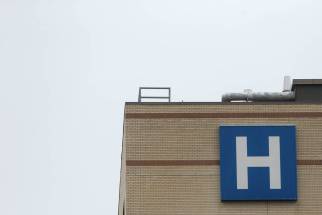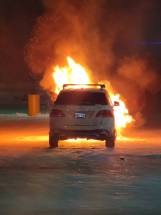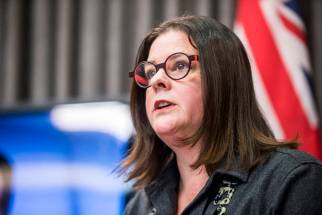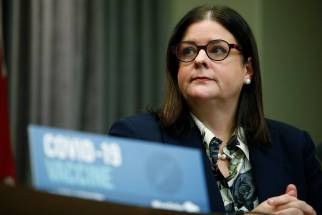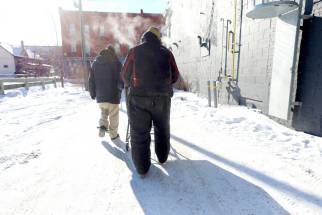Manitoba to halt close-contact notices in schools
Read this article for free:
or
Already have an account? Log in here »
To continue reading, please subscribe:
Monthly Digital Subscription
$0 for the first 4 weeks*
- Enjoy unlimited reading on winnipegfreepress.com
- Read the E-Edition, our digital replica newspaper
- Access News Break, our award-winning app
- Play interactive puzzles
*No charge for 4 weeks then price increases to the regular rate of $19.00 plus GST every four weeks. Offer available to new and qualified returning subscribers only. Cancel any time.
Monthly Digital Subscription
$4.75/week*
- Enjoy unlimited reading on winnipegfreepress.com
- Read the E-Edition, our digital replica newspaper
- Access News Break, our award-winning app
- Play interactive puzzles
*Billed as $19 plus GST every four weeks. Cancel any time.
To continue reading, please subscribe:
Add Free Press access to your Brandon Sun subscription for only an additional
$1 for the first 4 weeks*
*Your next subscription payment will increase by $1.00 and you will be charged $16.99 plus GST for four weeks. After four weeks, your payment will increase to $23.99 plus GST every four weeks.
Read unlimited articles for free today:
or
Already have an account? Log in here »
Hey there, time traveller!
This article was published 13/01/2022 (1426 days ago), so information in it may no longer be current.
Manitoba families will no longer receive a COVID-19 notice from a principal if there is a single classroom exposure — even if their child is a close contact — as the province’s pandemic case management approach evolves to address the rapid spread of the Omicron variant.
Days before K-12 students and teachers return to in-person learning, officials have announced a new strategy to manage the novel coronavirus at a school-wide level instead of on a case-by-case basis.
The update is in line with a recent overhaul in contact tracing at-large, which became an individual’s responsibility late last month, to alleviate the workloads of public health nurses.
“We have to adapt to working, learning, living with COVID,” said Dr. Brent Roussin, chief provincial public health officer, during a virtual news conference Thursday.
“It’s not possible to manage cases at that individual level anymore. We have to focus on managing the risk at the community level. This is not giving up on dealing with Omicron or COVID-19. Because this virus has changed significantly, we have to change our approach significantly — and that’s what we’ve done.”
Since September 2020, school leaders have filled in template exposure letters and sent notices to families whenever a case is identified in their building.
Schools will continue to track cases when parents notify them about a positive test result, be it via rapid antigen or PCR test. They will now be expected to simply “regularly communicate” attendance patterns and absenteeism levels, per a provincial slideshow presentation provided to school leaders.
The province’s school case map will also continue to be updated.
Should a school record a significant number of cases or an unusually high number of absences, administrators will alert public health officials to figure out next steps.
Either of the above could prompt a recommendation to implement a local asymptomatic surveillance program, during which rapid tests will be supplied to staff and students to measure transmission, a pause of higher-risk activities at times of high spread, or a one-week long stint of remote learning.
Parents can expect to see a surge in cases in classrooms in the coming weeks, given how widespread community transmission is at present, so the new plan is to “manage our risk, not eliminate it,” Roussin said.
“They say the next step is we mitigate the risk, so let’s mitigate the risk by checking the CO2 levels in the classroom, opening the windows when the ventilation is not good, moving to another location, putting in portable HEPA filtration units, that can be delivered in a week, and N95 masks,” said Luanne Karn, a mother of an elementary schooler and member of Safe September MB.
The grassroots movement has been advocating for additional resources for public health measures in schools that have been backed by science throughout the COVID-19 pandemic.
Parents want to know if there is a positive case in their child’s class, Karn said, suggesting the province’s latest announcement contradicts the spirit of its own legislation.
According to the Public Schools Act, a principal must notify a local health authority if they have reason to believe a student attending their school “has been exposed to or is suffering from a communicable disease.”
The province’s top doctor indicated a shift in case management is happening due to how contagious the new variant is, and how rarely children with COVID-19 infections end up with severe outcomes.
From Dec. 1, 2021, to Jan. 10, Roussin said there were 6,703 cases of COVID-19 among children ages newborn to 18. Of which, just 46 ended up in hospital, 31 of those were admitted for non-COVID reasons, both amounting to less than one per cent.
“This data tells us that, in general, the risk for children is relatively low,” the doctor said, adding in-person learning helps students with skills, mental health and physical activity.
“We know that students learn best in the classroom, and those benefits cannot be understated,” agreed Education Minister Cliff Cullen.
The minister added the province is confident divisions know their schools best and have implemented all guidance to ensure that students are protected.
Schools will enter restricted (code orange) on the provincial pandemic response system Monday, meaning physical distancing of two metres is being encouraged “to the greatest extent possible” and medical masks will be required among staff. Extracurriculars are still allowed, although tournaments and overnight trips are temporarily banned.
The Manitoba Teachers’ Society wants to know exactly how classrooms will have changed between mid-December and Monday to ensure staff and students are safe.
“The government said, ‘We’ll take a week, we’re going to make the system safer, we’re going to invest a lot of money,’ but how is it safer?” said union leader James Bedford, who represents upwards of 16,000 public school educators.
Also Thursday, Bedford said contact tracing, which has been on the shoulders of principals for months, is now becoming “even more ad-hoc.” Intervention will now happen if there are lots of cases or high absenteeism, when it’s too late, he said.
The province did not provide thresholds for “high” caseloads or absenteeism Thursday.
Principal Ross Meacham welcomes the changes, which he is hopeful will address “impossible” case management and free-up public health nurses so schools can consult them on concerns unrelated to COVID-19.
Pre-pandemic, schools could easily connect with officials to discuss issues ranging from students having impetigo to supporting families with bed bug infestations.
In recent days, Meacham has been tracking down families and sending out various letters linked to five different cases connected to Riverbend Community School in north Winnipeg. He said he’s been unable to get much else done, given how much work is required with the current protocols.
The school leader said he understands change can be difficult, but families can continue to expect schools to have children’s interests at heart, as they always have.
Meacham added: “Schools have never stopped being a place that communities can trust.”
— with files from Dylan Robertson
maggie.macintosh@freepress.mb.ca
Twitter: @macintoshmaggie

Maggie Macintosh reports on education for the Winnipeg Free Press. Funding for the Free Press education reporter comes from the Government of Canada through the Local Journalism Initiative.
Our newsroom depends on a growing audience of readers to power our journalism. If you are not a paid reader, please consider becoming a subscriber.
Our newsroom depends on its audience of readers to power our journalism. Thank you for your support.
History
Updated on Thursday, January 13, 2022 4:25 PM CST: Photo fixed.
Updated on Thursday, January 13, 2022 7:01 PM CST: Updates with full write-thru, new quotes, background info, new photos, formatting

